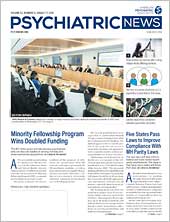APA’s Board of Trustees has approved a policy to advocate for state and federal legislation to provide funds to help repay loans for psychiatrists in community mental health centers, state psychiatric hospitals, and correctional facilities and for those using telemedicine to treat patients in these facilities.
The decision stemmed from an Assembly action paper approved by the APA Board of Trustees at its meeting last month in Washington, D.C. It was among a number of issues addressed by the Board, including ligature risk in hospitals, weapons use in inpatient facilities, solitary confinement of juveniles, and physician burnout.
The action paper addressing loan repayment for psychiatrists working in certain public settings was sponsored by Mary Jo Fitz-Gerald, M.D., and Mark Townsend, M.D., both representatives from the Louisiana Psychiatric Association. It was cosponsored by 17 other Assembly representatives.
The action paper noted that a 2012 report by the Association of American Medical Colleges indicated that some 86 percent of graduates have medical school debt, and the average debt for medical students across the country in 2011 was more than $160,000.
Meanwhile, the projected need for psychiatrists is greatly outpacing the current supply. The Department of Health and Human Services reports about 4,000 areas where there is only one psychiatrist for 30,000 or more individuals. More than 45 percent of psychiatrists are over age 60.
The action paper also emphasized that there is precedent for federal subsidies of medical school loans. The Clay Hunt Suicide Prevention for American Veterans Act (Clay Hunt SAV Act), signed into law by President Barack Obama in 2015, established a pilot project encouraging more psychiatrists to choose a career with the Veterans Health Administration (VHA) by offering medical school loan repayments on par with other government agencies and private practices.
The position statement also includes recommendations for hospitals to reduce weapon use overall by staff in hospitals when dealing with behaviorally disturbed patients.
Other Reports and Actions
•
Ligature risks: Trustees heard a report from APA CEO and Medical Director Saul Levin, M.D., M.P.A., about the issue of ligature risks in inpatient psychiatric facilities. Last year administrators at many hospitals expressed concern about the increased monitoring and enforcement of citations by the Centers for Medicare and Medicaid Services (CMS) and The Joint Commission around elimination of ligature risks that were costing facilities exorbitant amounts of money (
Psychiatric News, December 1, 2017). Levin said that APA is continuing to work with CMS and The Joint Commission about the issue. Meanwhile, he said that APA had surveyed 84 facilities in 34 states and the District of Columbia between April and June. Of the 55 that responded, 10 had closed inpatient beds due to the assessment of fines for ligature risks, and 14 had closed psychiatric beds. Twenty-three facilities reported paying fines between $100 and $6 million.
•
Physician burnout: Trustees approved the formation of the Committee on Well-Being and Burnout under the Council on Medical Education and Lifelong Learning. The committee represents a continuation of the Ad Hoc Work Group on Well-Being and Burnout, appointed by then APA President Anita Everett, M.D.
•
Discrimination against religious minorities: The Board voted to approve a position statement condemning acts of discrimination against any religious minority and affirming findings in the literature that isolation of religious minorities in the United States exacerbates negative mental health effects resulting from religious discrimination. Further, the statement urges practicing psychiatrists to reach out to and support patients and communities of religious minority groups in this country.
•
Solitary confinement of juveniles. Trustees approved a position stating that “solitary confinement of juveniles (also referred to as restrictive housing or segregation), with rare exceptions, should be avoided due to the potential for harm to the juveniles.” In the rare case that a juvenile must be placed in solitary confinement, meaningful access to mental health care, medical care, education, and recreation should be provided to minimize the potential for psychological harm. Solitary confinement should never be used for punitive purposes, according to the statement. It was written by the Council on Psychiatry and Law; the Council on Children, Adolescents, and Their Families; and the Council on Minority Mental Health and Health Disparities. ■
Position statements approved by the Board of Trustees can be accessed
here. Archived summaries of Board actions can be accessed
here.


